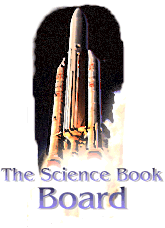![]()
 |
|
|
|
If you wish to purchase further titles already reviewed here, please return each time to SBB. Using the direct links available at our site is easier than searching by title, author, or ISBN number.
EDITORIAL INFORMATION A mysterious figure, virtually unknown even in his own country, Sergei Pavlovich Korolev masterminded not only the historic launch of Sputnik and the first intercontinental ballistic missile, but Yuri Gagarin's epochal space flight, and, ultimately, the soviet attempt to beat America to the moon. Who was Korolev? Where did he come from? Why is so little known about him? In this groundbreaking new book, James Harford uncovers the extraordinary story of one of the true pioneers of the space program. Based on extensive interviews with and memoirs of participating engineers and scientists, as well as family and friends, Korolev affords a rare glimpse into the inner circles of a world often cloaked in secrecy and intrigue. Spanning the decades from the 1930s to the 1960s, this is a beautifully detailed blend of biography and recent history, chronicling the remarkable rise of one man from imprisonment in a Soviet gulag on trumped up charges to lead his nation's space program. (Extracted from the dust-jacket).
GENERAL TABLE OF CONTENTS
OUR REVIEW From time to time there appear in the editorial panorama books that given their intrinsic interest will very soon become classical works. Korolev, How One Man Masterminded the Soviet Drive to Beat America to the Moon, has a title that tells everything. The work done by James Harford in this book takes us into one of the darkest times in the Soviet astronautics and presents us with the history of a man, Sergei Korolev, who by himself caused a revolution in the space race making it into what it became. Yet despite the crucial importance of this engineer, up to now rather unknown to us, nothing beyond what the secrecy that surrounded his figure up to his death allowed the world to know had transpired to us so far. In this sense, the work done by Harford is truly revealing, and puts this personality on the peak he really merits. We will learn, for instance, how his genius in rocket technology was made available to the Soviet state and how, thanks to his talent, the URSS was capable of competing with the Americans and trying to beat them. This is how the hidden history of the Soviet lunar manned and unmanned program comes to the light, conforming a dense work full of shades that will delight those readers with a passion for Russian astronautics. Like any other biography, we will get to know the human side of the protagonist, and the details of what, had not an untimely death prevented this, such a charismatic man could have accomplished in his life. Korolev, one of the acknowledged fathers of world astronautics, ceases to be an unknown character in this book, written by one of the few authors having the sufficient background to engage in this colossal enterprise of research and compilation. Because Korolev not only is the history of a man, it also is that of the Soviet space program of an era that will never return. |
|||
![]()
Main Page | What's New | Reviews | Indexes | Links